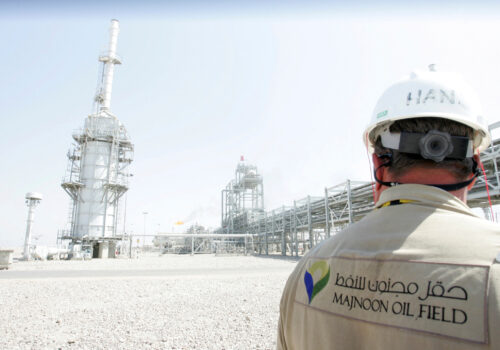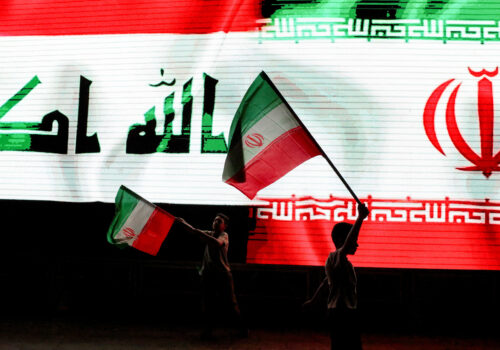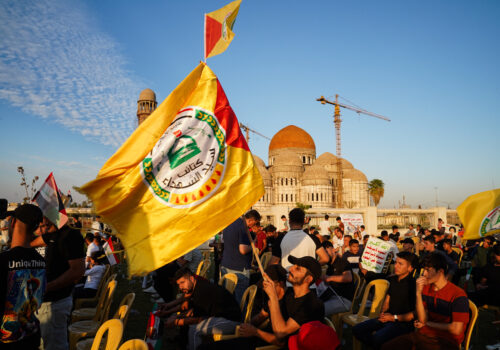Inside the divides of Iraq’s Coordination Framework—and why they matter ahead of landmark elections
Iraq will soon hold its sixth round of parliamentary elections.
The most recent elections held in October 2021 brought many surprises in the wake of the 2019 protests: a new electoral law that seemed more equitable and representative, a sweeping victory for the mercurial Shia cleric Muqtada al-Sadr, and the emergence of independent Shia candidates. The coming elections on November 11 will be different: The election law has reverted to a previous model that favors larger parties, al-Sadr has declared a boycott, and the prospects of independent candidates are less bright. Some elements are constant: the elections will be run on ethno-sectarian lines, principally Shia, Sunni, and Kurdish, and of these the most significant will be the election of Shia candidates.
For Iraq’s majority Shia faction, al-Sadr’s boycott is poised to monopolize their vote within the Coordination Framework (CF)—an alliance of Shia parties, formed originally in 2021 to counter al-Sadr’s rising political power. All of them have a lesser or greater degree of dependence on Iran.
With Tehran’s help and support, the CF has held together as the single representative of the Shia despite internal differences, in stark contrast to the factionalism and disarray of Iraq’s Sunni parties. But political rivalries and incompatible interests have created significant fissures within the CF in the run-up to elections—ones that pose threats to Prime Minister Mohammed Shia al-Sudani and his bid to maintain power.
Shia politicians describe these elections as decisive and fateful—as indeed they do in every election season. While not necessarily fateful, these elections are important—given the surging waves of change spreading throughout the region and the need for Iraq to decide where to position itself in the new landscape taking shape.
The Shia electoral environment
Shia political parties are particularly concerned about turnout, since voter apathy is still pronounced among Shia voters. In the 2021 elections, the official turnout was 40 percent at the national level, but was lower in the central and southern provinces.
Voter skepticism signals absence of trust in the integrity and value of the electoral process, in the politicians running for election, and in the political system as a whole. Amid proliferating reports of vote-buying, many grassroots voices are calling for a boycott of the elections to signal their disapproval of a political system that produces no change of faces or political practices. Al-Sadr describes voting as an endorsement of a corrupt system. Optimists, on the other hand, argue that boycotting elections will only ensure a continuation of the status quo and that change, however slow, can only come through voting for better candidates.
Al-Sadr is the most prominent spokesman of the rejectionist camp: He has emphatically declared his decision to boycott the elections and denounced the political establishment as corrupt and unreformable. While he has forbidden his followers from running as candidates, it is less clear if al-Sadr has also prohibited voting. This is significant. It is estimated that al-Sadr can command hundreds of thousands of votes—and if Sadrists go to the polls, they can swing the elections in Baghdad and cities in the south. There have been unconfirmed reports that other Shia leaders have tried to woo al-Sadr, perhaps in an effort to gain the votes of his followers. However, there is no indication that these approaches have been fruitful.
Fissures within the Coordination Framework
Within the CF, there are many disagreements shaping the discourse this election cycle: over the government’s policy towards Syria, allegiance to Iran, an aborted law regarding the Iran-aligned Popular Mobilization Forces (PMF) that was strongly opposed by the United States, and, not least, the competing economic interests of the Shia factions. Three of the groups within the CF are also members of the PMF: the US-designated Asa’ib Ahl al-Haq (AAH) and Kataib Hizballah (KH), as well as the Badr Corps.
But the major rift is the political rivalry between former Prime Minister Nouri al-Maliki and al-Sudani. Neither of them has made any secret of his ambition to lead a post-election government. While the campaigns have focused on the competition between the various Shia factions, al-Sudani and al-Maliki represent the two rival poles. Observers predict that al-Sudani will win a plurality of Shia seats in parliament.
But al-Maliki and his “State of Law” coalition have harped on several themes to undermine al-Sudani’s tenure as prime minister, both implicitly and explicitly. They have raised alarm about a surreptitious return of Baathists to power through the elections, and hundreds of candidates bave been disqualified, rightly or wrongly, under the laws of de-Baathification. Opponents of al-Sudani have condemned the use of government resources in the campaign, indirectly accusing him of exploiting his office for electioneering. His detractors have also criticized the poor state of services after three years of the current government, al-Sudani’s relations with the new Sunni regime in Syria, and the warm relations between the prime minister and other Arab countries, which influential members of the CF view as hostile to Shia supremacy in Iraq. Al-Sudani’s conciliatory relationship with the Kurdish government has also come under criticism from his rivals in the CF.
Al-Sudani, for his part, has maintained an appearance of being above the fray. As prime minister, he has cultivated the high profile of incumbency and turbo-charged his public activities. He has accelerated construction projects underway in Baghdad and the governorates, cut ribbons for completed hospitals and schools, signed contracts and memorandums of understanding with major Western oil companies like BP and Exxon, traveled to regional countries including Oman and the United Arab Emirates, and negotiated a deal to resume oil exports from Kurdistan. He traveled to Sharm el-Sheikh, Egypt to attend the Gaza Peace Summit, where he had a photo-op with US President Donald Trump.
As a measure of al-Sudani’s rising fortunes, several prominent candidates who previously ran with al-Maliki’s coalition have switched to al-Sudani’s “Reconstruction and Development” list.
Shia fears amid a Sunni landscape
Regional developments have also shaped the campaign of Shia parties. The waning of Iran’s military and financial capabilities, the Israeli military campaign’s decimation of Hezbollah in Lebanon and Hamas in Gaza, and the rise of a Sunni regime in Syria have rattled Iraq’s Shia parties. They fear that they have lost a protective environment and that Shia rule in Iraq is threatened. Increasing US pressure through targeted sanctions on the PMF’s factions has raised the level of anxiety.
Therefore, in addition to the internal rivalries within the CF, the Shia political parties are especially sensitive about their continued dominance over the state. Low voting numbers among their constituency in Iraq’s center and south, set against high Sunni turnout, can, they fear, result in “unnaturally” high Sunni seats in parliament and increased influence. They believe this to be especially dangerous in Baghdad, a religiously diverse city that commands sixty-nine seats in parliament, where the Shia will be competing for votes not just against fellow Shia parties, but also against energized Sunni candidates. Shia spokesmen have warned of this danger, adopting a sectarian, alarmist rhetoric to exhort Shia voters to go to the polls. In a public speech that has gone viral, Sayed Ammar al-Hakim, the leader of the Hikma Movement, used the slogan “don’t lose it” to urge them to vote.
Although sympathetic commentators explained this as a call to preserve democracy and balance in state affairs, others in the media interpret the slogan as a call for the Shia to turn out in large numbers in order to preserve their majority in parliament. In a more provocative statement that has raised an uproar of condemnation by Sunnis and others, Jalal Eddin al-Saghir, an extremist Shia cleric, warned that if the Shia don’t vote, then “Abdel Zahra will be the servant of Omar,” the first being a typical Shia name and the second typically Sunni.
The elusive prize
The ultimate prize following elections is the leadership of the government. This is where matters become complicated. The selection of prime minister and the formation of the government has always been a fraught and prolonged process. After the elections of October 2021, for example, parliament took a year to confirm al-Sudani as prime minister.
Nothing in Iraq’s constitution says that the prime minister must be a Shia—nor that the president be Kurdish and the speaker of parliament Sunni. Nevertheless, since 2003, this has been the de facto practice. Since 2022, the CF, as the umbrella coalition of the Shia, has assumed the right of nomination and indeed nominated one of its own, al-Sudani, and secured a vote of confidence in parliament.
Al-Sudani wants a second term, but others in the CF want to unseat him, most notably al-Maliki and some factions of the PMF. For months, parties within the CF have been maneuvering and prepositioning to nominate their candidate. Al-Sudani’s electoral list is widely expected to do well in the elections—a candidate on his list even projected as many as seventy seats, which, if it materializes, will likely present a plurality of the Shia vote.
But even such a big win does not guarantee al-Sudani a second term. In 2022, he secured the nomination and the post with only two seats in parliament. To be successful, a candidate must have the support of a majority within the CF and be prepared to make concessions and promises to safeguard the interests of its members.
In turn, the CF also needs to choose a candidate who will not call down the wrath of the US sanctions regime or military threats, so palpably felt during the first Trump administration, while still securing Iranian approval. In a volatile and rapidly evolving regional environment, the CF will face a formidable challenge after the elections. Whatever the result of the elections, a surprise candidate may emerge.
The November election will not necessarily determine who the next prime minister will be, but it will provide an opportunity to shift power dynamics within the fractious Shia bloc. It will be an excellent indicator of the relative strength of the individual Shia parties that make up the CF and the clout each can wield in future decision-making. Since the Shia will continue to formulate policy and dominate decision-making, how this election shifts power dynamics within the CF will be a good signpost to political trends in Iraq for the new government’s four year term.
Rend Al-Rahim is a nonresident senior fellow with the Iraq Initiative in the Atlantic Council’s Middle East programs. A leading expert on Iraqi politics and civic development, she served as Iraq’s first ambassador to the United States from 2003 to 2005, following the fall of Saddam Hussein.
Further reading
Tue, Oct 28, 2025
US energy firms are returning to Iraq—but politics could undo their fortunes
MENASource By
Al-Sudani's rush to sign deals with US firms over the past few months is fundamentally about political survival, both his own and Iraq’s.
Mon, Jun 30, 2025
Balancing acts and breaking points: Iraq’s US-Iran dilemma
MENASource By C. Anthony Pfaff
The future of US–Iraq relations is neither as dim as it may first appear, nor as promising as one might hope.
Thu, Oct 23, 2025
Why Washington’s anti-PMF moves are testing the Iraq partnership
MENASource By
The US campaign against the PMF groups will likely have significant implications for Iraq’s political process moving forward.
Image: A man walks past campaign posters of Iraqi parliamentary candidates displayed on a street, ahead of the upcoming parliamentary elections, in Mosul, Iraq, October 29, 2025. REUTERS/Khalid al-Mousily


